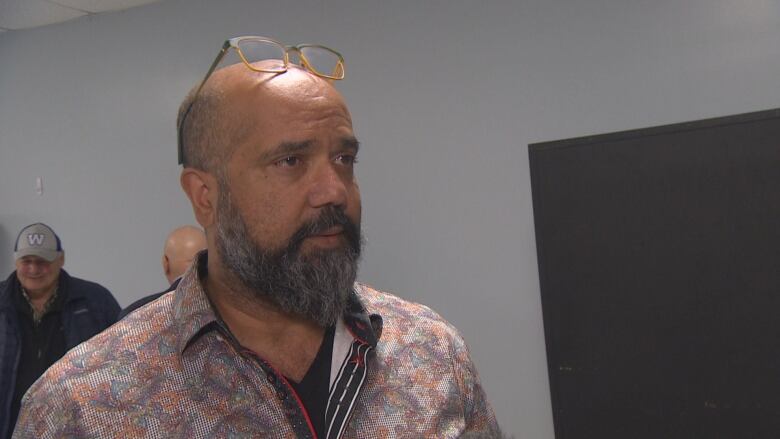Concerns mount in southeast Manitoba over proposed silica sand mining project near Vivian
More than 100 people attended public hearing in Anola, Man. on proposed mining project
A mining project that would potentially pump upwards of $1-billion into the provincial economy over nearly a quarter century has plenty of opposition.
Residents, business owners and politicians from in and around the Rural Municipality of Springfield packed the Anola Community Centre on Saturday for a public consultation, many raising concerns about Calgary-based Sio Silica's proposed sand silica mine.
The consultation comes as the Clean Environment Commission engages in three weeks of public hearings on the project in southeast Manitoba.
Sio Silica is proposing to extract silica sand buried in the hamlet of Vivian, which is about 50 kilometres east of Winnipeg. There's also a plan to expand operations south into the Rural Municipality of Tache.
The company plans to inject air to bring up a mixture of water and sand from the water table, which extends under a large swath of southeastern Manitoba and serves eight municipalities.
The extraction target is to ship 1.36-million tonnes of silica sand to green energy and technology markets annually over the 24-year life of the mine.
Carolyn Whyte, who has called the Springfield municipality home for 39 years, was among those who voiced concerns if the project is green-lit by the provincial government.

Whyte pointed to the "enviable supply of pristine quality water" in the rural municipality, which she believes the proposed mine could put at risk.
"One of the greatest concerns with this proposal is the risk, indeed expectation, that the shale barrier between the Red River carbonate and the Winnipeg sandstone aquifers will be further compromised and mixing will be inevitable," Whyte said.
"Over 9,000 proposed wells will unavoidably contribute to these mixing of the aquifers and increased contamination possibilities."
She understands the complexity that surrounds the process, and admitted, "I don't think a lot of us truly understand what's going on."
Tangi Bell, who lives in Anola, called what Sio Silica is doing "unethical and utter madness," and worries that carcinogens could be produced if silica sand gets airborne. According to the Canadian Centre for Occupational Health and Safety, repeated exposure to silica can cause cancer and organ damage.
"This aquifer system needs protection, reverence, not exploitation by industry," Bell said.

Bell understands there is an economic need to obtain silica, but she says it shouldn't be at the expense of drinking water in southeastern Manitoba.
"I think that is an error of good judgment. That's just not right," she said.
However, some area residents are backing the project.
Marcel Benjamin, whose firm Benjamin Mechanical Inc., manufactures solar components in Ste Anne, Man., likes the idea of the approximately 800 jobs Sio Silica could bring to the area, as well as the increased attention it would bring to the field of solar panel manufacturing. Silicon is used to produce solar cells.
"We all know that we need to work toward the decarbonizing of our planet," he said. "Being able to buy solar panels locally instead of bringing them in from China would be a huge key factor for us here in Canada."
However, he stressed, the proposed project "has to be mined responsibly in order to be viable for everyone."

'Sensitive issue'
"I think people have very legitimate concerns, absolutely 100 per cent, and I think they're going to have to be taken in consideration by the Clean Environment Commission board," Armand Poirier, mayor of the Rural Municipality of Tache, said on Sunday.
Poirier, who also chairs the municipal silica sand advisory committee comprising eight municipalities, says his local council has been dealing with the prospective mine since early 2020.
"It seems that the the opinions that were expressed on Saturday were of a majority," he said."There were some delegates that showed up in favour of the project, but much fewer than the ones that were opposed to the project."
He said "there's a lot of fear" that when the sand is removed underneath that the shale and limestone will collapse, and potentially cause two aquifers to mix.

Silo Silica president and chief executive officer Feisal Somji, who was at Saturday's public consultation, says he understands emotions can run high.
"The proposed project is looking to go into a drinking water aquifer, and that's a sensitive issue for everybody regardless of what side of the fence you're on," he said.
Somji added that's important for everyone to have the ability to express their concerns, but believes there's a lot of disinformation and misunderstanding out in the public about the project.

There is a strong technical group of experts behind Sio Silica and behind the provincial government itself, Somji says, and he asked people to "have some trust and some faith in all of those various experts."
According to the provincial licence granted to the company, it must finish construction of its processing plant by December 2024.
The Clean Environment Commission will be meeting at Brokenhead River Community Hall in Beausejour on Monday, from 1:30 to 4:30 p.m., with a public consultation to follow from 7 to 9 p.m.
With files from Catherine Moreau

